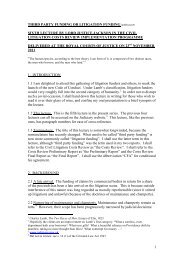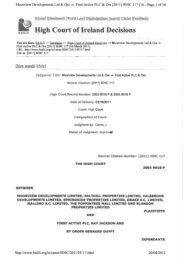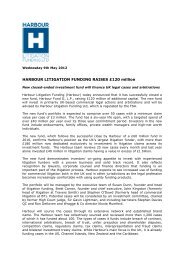Download PDF document - Harbour Litigation Funding
Download PDF document - Harbour Litigation Funding
Download PDF document - Harbour Litigation Funding
Create successful ePaper yourself
Turn your PDF publications into a flip-book with our unique Google optimized e-Paper software.
Myatt & Ors v National Coal Board [2007] EWCA Civ 307 (16 March 2007)<br />
[Home] [Databases] [World Law] [Multidatabase Search] [Help] [Feedback]<br />
England and Wales Court of Appeal (Civil<br />
Division) Decisions<br />
You are here: BAILII >> Databases >> England and Wales Court of Appeal (Civil Division) Decisions >> Myatt & Ors v National Coal Board<br />
[2007] EWCA Civ 307 (16 March 2007)<br />
URL: http://www.bailii.org/ew/cases/EWCA/Civ/2007/307.html<br />
Cite as: [2007] PNLR 25, [2007] WLR 1559, [2007] 1 WLR 1559, [2007] EWCA Civ 307, [2007] 4 Costs LR 564, [2007] 4 All ER 1094<br />
[New search] [Printable RTF version] [Buy ICLR report: [2007] 1 WLR 1559] [Help]<br />
IN THE SUPREME COURT OF JUDICATURE<br />
COURT OF APPEAL (CIVIL DIVISION)<br />
ON APPEAL FROM THE SUPREME COURT COSTS OFFICE<br />
(MASTER WRIGHT)<br />
Neutral Citation Number: [2007] EWCA Civ 307<br />
Case No: A2/2005/2160(B)<br />
B e f o r e :<br />
LORD JUSTICE DYSON<br />
LORD JUSTICE LLOYD<br />
and<br />
SIR HENRY BROOKE<br />
____________________<br />
Between:<br />
Royal Courts of Justice<br />
Strand, London, WC2A 2LL<br />
16 March 2007<br />
MYATT & ORS<br />
- and -<br />
NATIONAL COAL BOARD<br />
Claimant<br />
Defendant<br />
____________________<br />
(DAR Transcript of<br />
WordWave International Limited<br />
A Merrill Communications Company<br />
190 Fleet Street, London EC4A 2AG<br />
Tel No: 020 7404 1400 Fax No: 020 7831 8838<br />
Official Shorthand Writers to the Court)<br />
http://www.bailii.org/ew/cases/EWCA/Civ/2007/307.html[12/10/2012 10:35:46]
Myatt & Ors v National Coal Board [2007] EWCA Civ 307 (16 March 2007)<br />
____________________<br />
SIR G NICE QC (instructed by Messrs Ollerenshaw) appeared on behalf of the Appellant.<br />
MR J MORGAN QC (instructed by Messrs Nabarro Nathanson) appeared on behalf of the Respondent.<br />
____________________<br />
Lord Justice Dyson:<br />
HTML VERSION OF JUDGMENT<br />
____________________<br />
Crown Copyright ©<br />
1. On 18 July 2006 we dismissed the claimants' appeals. We held that the CFAs were unenforceable. Our decision<br />
is now reported in 2007 1 WLR 554. The issue of costs was adjourned generally. We ordered that Ollerenshaws,<br />
the claimants' solicitors, be joined as parties to the appeals for the purposes of costs only pursuant to CPR 48.2.<br />
The parties agreed that Ollerenshaws should have time for further consideration. The claimants, meanwhile,<br />
sought leave to appeal to the House of Lords. Their petitions were dismissed on 6 December 2006.<br />
2. It is not in issue the defendant is entitled to its costs of the appeal. It seems to be common ground that the<br />
claimants have no insurance against any liability for costs: this is because it was a condition precedent to the<br />
liability of the insurers under the claimants' ATE policies that enforceable CFAs were in place. If the claimants<br />
had the benefit of such insurance, the defendant would be content with an order for costs against them. It is in<br />
these circumstances that the defendant seeks an order for costs against the solicitors.<br />
3. We were given figures for Ollerenshaws' profit costs and disbursements in the four cases. They ranged from<br />
£5,000 to £7,100. By far the most substantial disbursements were the ATE insurance premiums, which were<br />
£1,522 in each case. The total disbursements were approximately £2,500 in each case. The four cases were in the<br />
nature of test cases so far as Ollerenshaws were concerned. We were told that there are about 60 other cases<br />
where clients have entered into CFAs with Ollerenshaws in circumstances not materially different from those<br />
which obtained in the four cases before us. It follows from our judgment that the CFAs in those cases are not<br />
enforceable either.<br />
4. The financial consequences of our decision for Ollerenshaws are very serious indeed. On the basis that<br />
Ollerenshaws' average profit costs in all those cases is in the range of £3,000-£4,000 it can be seen that was what<br />
at stake for Ollerenshaws in these appeals was their entitlement to a sum in the region of £200,000. It is clear<br />
that the four claimants had a financial interest in the appeals since the finding of Master Wright that the CFAs<br />
were unenforceable -- which they sought to challenge -- left them with a considerable shortfall in the recovery<br />
of costs which would inevitably have to be paid out of their damages. The agreed damages were very modest:<br />
sums of the order of £3,000-£4,000. The disbursements remained payable and/or were irrecoverable by the<br />
claimants, notwithstanding that the CFAs were unenforceable.<br />
5. The question that arises for our decision is whether, despite the claimants' financial interest, there is jurisdiction<br />
to order that Ollerenshaws should pay some or all of the defendant's costs and if so how that jurisdiction should<br />
be exercised. Mr Morgan QC submits that Ollerenshaws had a substantial interest in appealing the decision of<br />
Master Wright and that that is sufficient to found jurisdiction to make the order the defendant seeks. He relies on<br />
section 51 of the Supreme Court Act 1981 which, so far as is material, provides:<br />
"(1) Subject to the provisions of this or any other enactment and to rules of court, the<br />
costs of and incidental to all proceedings in –<br />
(a) the civil division of the Court of Appeal…<br />
shall be in the discretion of the court.<br />
http://www.bailii.org/ew/cases/EWCA/Civ/2007/307.html[12/10/2012 10:35:46]
Myatt & Ors v National Coal Board [2007] EWCA Civ 307 (16 March 2007)<br />
…<br />
"(3) The court shall have full power to determine by whom and to what extent the costs<br />
are to be paid."<br />
He also relies upon CPR 48.2, to which I need not refer.<br />
6. The apparently wide language of section 51(1) and 51(3) has been the subject of considerable judicial<br />
interpretation. Sir Geoffrey Nice QC submits that Ollerenshaws were acting as the claimants' legal<br />
representatives in pursuing the appeal and that for that reason there is no jurisdiction to make the order sought.<br />
He places considerable reliance on the decision of this court in Tolstoy-Miloslavsky v Aldington [1996] 1<br />
WLR 736 and the judgment in particular of Rose LJ. At page 743 Rose LJ said:<br />
"Section 51(1) and (3) of the Supreme Court Act 1981 do not confer jurisdiction to<br />
make an order for costs against legal representatives when acting as legal<br />
representatives."<br />
He then gave six reasons for that conclusion. At page 745 H he said:<br />
"In my judgment Mr Mansfield is correct in his submission that there are only three<br />
categories of conduct which can give rise to an order for costs against a solicitor:<br />
1. It is within the wasted costs jurisdiction of section 51(6) and (7);<br />
2. It is otherwise a breach of duty to the court, such as even before the<br />
Judicature Acts could found an order, eg if he acts even unwittingly without<br />
authority or in breach of an undertaking;<br />
3. If he acts outside the role of solicitor, eg in a private capacity or as a true<br />
third party funder for someone else."<br />
Sir Geoffrey also points out that an order for payment of costs by a non-party will always be "exceptional", see<br />
per Balcolme LJ in Symphony Group PLC v Hodgson [1994] 1 QB 179, 192.<br />
7. But it is now necessary to have regard to the judgment of the Privy Council given by Lord Brown of Eatonunder-Heywood<br />
in Dymocks v Todd [2004] 1 WLR 2807 [2004] UKPC 39, especially paragraph 25 where he<br />
said:<br />
"A number of the decided cases have sought to catalogue the main principles governing<br />
the proper exercise of this discretion, but their Lordships, rather than undertake an<br />
exhaustive further survey of the many relevant cases, would seek to summarise the<br />
position as follows:<br />
1. Although cost orders against non-parties are to be regarded as<br />
'exceptional', exceptional in this context means no more than outside the<br />
ordinary run of cases where parties pursue or defend claims for their own<br />
benefit and at their own expense. The ultimate question in any such<br />
'exceptional' case is whether in all the circumstances it is just to make the<br />
order. It must be recognised that this is inevitably to some extent a fact<br />
specific jurisdiction and that there will often be a number of different<br />
considerations in play; some militating in favour of an order, some against.<br />
2. Generally speaking, the discretion will not be exercised against 'pure<br />
funders' described in para 40 of Hamilton v Al Fayed (No 2) [2003] QB<br />
http://www.bailii.org/ew/cases/EWCA/Civ/2007/307.html[12/10/2012 10:35:46]
Myatt & Ors v National Coal Board [2007] EWCA Civ 307 (16 March 2007)<br />
1175-1194 as 'those with no personal interest in a litigation, who do not<br />
stand to benefit from it, are not funding it as a matter of business and in no<br />
way seek to control its course.' In their case the court's usual approach is to<br />
give priority to the public interest in the funded party getting access to<br />
justice over that of the successful unfunded party recovering his costs and<br />
so not having to bear the expense of vindicating his rights.<br />
3. Where, however, the non-party not merely funds the proceedings but<br />
substantially also controls or at any rate is to benefit from them, justice<br />
would ordinarily require that if the proceedings fail he will pay the<br />
successful party's costs. The non-party in these cases is not so much<br />
facilitating access to justice by the party funded, as himself gaining access<br />
to justice for his own purposes. He himself is 'the real party' to the<br />
litigation, a concept repeatedly invoked throughout the jurisprudence (see,<br />
for example, the High Court of Australia in the Knight Case 174 CLR 178<br />
and Millet LJ's judgment in Metalloy Supplies Ltd v MA (UK) Ltd [1997]<br />
1 WLR 1613). Consistently with this approach Philips LJ described the<br />
non-party underwriters in T G A Chapman Ltd v Christopher [1998] 1<br />
WLR 12, 22 as 'the defendants in all but name'. Nor, indeed, is it necessary<br />
that the non-party be 'the only real party' to the litigation in the sense<br />
explained in the Knight case, provided that he is 'a real party in … very<br />
important and critical respects.'"<br />
8. In my judgment, the third category described by Rose LJ in Tolstoy's case should be understood as including a<br />
solicitor who, to use the words of Lord Brown in Dymocks is "a real party … in very important and critical<br />
respects" and who "not merely funds the proceedings but substantially also contributes, or at any rate, is to<br />
benefit from them". I do not accept that the mere fact that a solicitor is on the record prosecuting proceedings for<br />
his or her client is fatal to an application by the successful opposing party under section 51(1) and (3) of the<br />
Supreme Court Act 1981, that the solicitor should pay some or all of the costs.<br />
9. Suppose that the claimants had no financial interest in the outcome of the appeal at all because the solicitors had<br />
assumed liability for all the disbursements with no right of recourse against the clients. In that event, the only<br />
party with an interest in the appeal would be the solicitors. In my judgment, they would undoubtedly be acting<br />
outside the role of solicitor, to use the language of Rose LJ.<br />
10. Let us now suppose that the solicitors have the major financial interest in the outcome of the appeal but that the<br />
claimants have a modest financial interest in it as well. It would be very surprising if the existence of the<br />
claimants' modest financial interest meant that the solicitor's financial interest counted for nothing when deciding<br />
what order for costs it was just to make. Why should the existence of the claimants' modest financial interest<br />
deprive the court of the jurisdiction to make an order against the solicitors, which absent that interest it would<br />
undoubtedly have? Sir Geoffrey submitted that if a client has a financial interest in the success of the appeal, the<br />
solicitors are acting for him in the usual way, and it is nothing to the point that the solicitors may have a far<br />
greater financial interest of their own in the success of the appeal. In my view, this does not provide a<br />
satisfactory answer to the question that I have posed.<br />
11. Rose LJ did not have in mind the kind of hybrid situation that has arisen in the present cases. He did not have to<br />
consider the position of an appeal in whose success the solicitor has the principal interest but in which the client<br />
has his own lesser interest, too. It is at this point salutary to recall that Lord Brown said that the non-party need<br />
not be the only real party to the litigation, provided that he is "a real party… in very important and critical<br />
respects". I can think of no good reason why those observations should not apply with equal force to solicitors<br />
and non-solicitors. I have no doubt that there is jurisdiction to make an order under section 51(3) against a<br />
solicitor where litigation is pursued by the client for the benefit or to a substantial degree for the benefit of the<br />
solicitor.<br />
http://www.bailii.org/ew/cases/EWCA/Civ/2007/307.html[12/10/2012 10:35:46]
Myatt & Ors v National Coal Board [2007] EWCA Civ 307 (16 March 2007)<br />
12. I turn, therefore, to consider whether this court should make an order in the present case. What was at stake in<br />
the appeals of these four claimants? So far as the claimants were concerned, the disbursements of approximately<br />
£2,500 each; so far as Ollerenshaws were concerned, it was their profit costs of approximately £12,000-£16,000<br />
in the four cases. But of far greater significance was the fact that their profit costs in the region of £200,000 in<br />
approximately 60 cases were at stake. Viewed in this way, it seems to me inescapable that the main reason why<br />
this expensive appeal was launched was to protect Ollerenshaws' claim to their profit costs.<br />
13. In the Dymocks case at paragraph 20, Lord Brown made the point that, but for the involvement of the non-party,<br />
the unsuccessful appellant would not have pursued its appeal. We were not told by Sir Geoffrey whether the four<br />
claimants would have pursued their appeals to this court in order to obtain reimbursement from the defendant of<br />
their disbursements, but I think it most unlikely that they would have done so. It is unfortunate that the defendant<br />
did not warn Ollerenshaws at an early stage of the appeals process that, if the appeal failed, it would or might<br />
apply for costs against the solicitors. Failure to do this is a factor to be taken into account in deciding whether or<br />
not to make an order against the non-party; see Symphony Group page 193C. Sir Geoffrey did not tell us<br />
whether, if they had received such a warning at an early stage, Ollerenshaws would have abandoned the appeal.<br />
The fact that Ollerenshaws have not felt able to say that this is what they would have done leads me to conclude<br />
that it is unlikely that, faced with such a warning, they would have abandoned the appeal. Nevertheless, they<br />
were denied the opportunity of taking that course.<br />
14. I think it important to emphasise the need for parties who think that they may apply for an order for costs against<br />
solicitors in circumstances such as obtained in the present case to warn the solicitors at an early stage, so as to<br />
give them a reasonable opportunity for deciding whether or not to continue with the proceedings.<br />
15. In my view, a fair and just order to make in this case is to order Ollerenshaws to pay 50 per cent of the<br />
defendant's costs of the appeal. In arriving at this percentage I have taken into account the fact that the claimants<br />
had a real financial interest in the success of the appeals; their disbursements represented approximately one<br />
third of the total costs incurred by them before their claims were settled. I also take into account the fact that<br />
Ollerenshaws were not given a warning until the appeals had been dismissed that an application for costs might<br />
be made against them.<br />
16. As regards the other outstanding matters, it is agreed that the defendant should have interest on their costs from<br />
18 July 2006. As for a payment on account of costs, I suggest that we hear further argument from counsel in the<br />
light of our judgments.<br />
Lord Justice Lloyd:<br />
17. I agree. At the risk of repetition, but in the light of the potentially wider importance of the point, I add some<br />
observations of my own.<br />
18. In the Count Tolstoy case, as my Lord, Lord Justice Dyson, has said, Rose LJ enunciated at the top of page 746<br />
of the report that, relevantly to the present case, an order for costs can only be made against a solicitor if the<br />
solicitor is acting "outside the role of a solicitor, eg in a private capacity or as a true third party funder for<br />
someone else". Roch LJ put it in much the same way at page 750 E, saying this:<br />
"The legal representative who acts as a legal representative does not make himself a<br />
quasi party and no jurisdiction to make an order for costs against him under section<br />
51(1) (3) arises. However, a legal representative who goes beyond conducting<br />
proceedings as a legal representative and behaves as a quasi party will not be immune<br />
from a costs order under section 51(1) and (3) merely because he is a barrister or a<br />
solicitor."<br />
Ward LJ agreed with Rose LJ that section 51(1) and (3) have "no application to solicitors acting as such".<br />
19. Those observations do not, and did not purport to, set out in definitive terms exactly what is the borderline<br />
between the case where a solicitor acts purely as such in the ordinary way on behalf of a client and is therefore<br />
http://www.bailii.org/ew/cases/EWCA/Civ/2007/307.html[12/10/2012 10:35:46]
Myatt & Ors v National Coal Board [2007] EWCA Civ 307 (16 March 2007)<br />
immune from the jurisdiction of the court under sections 51(1) and (3), and on the other hand a case where the<br />
solicitor's acts are such that he is within the scope of that jurisdiction. Although the court in Count Tolstoy noted<br />
the enactment of the conditional fee provisions of the Courts and Legal Services Act 1990, it did not have<br />
occasion to consider the implications of those provisions in detail.<br />
20. In the present appeal, Sir Geoffrey Nice points out that the claimants have a real interest as regards their right to<br />
recover from the defendants the ATE insurance premium as well as other disbursements. The other<br />
disbursements would not, as I understand it, have been at issue on the appeal, but the ATE premium was, for<br />
reasons that my Lord has explained.<br />
21. Having succeeded in showing to be invalid the CFA, the defendants are entitled to resist any contention that they<br />
indemnify the claimants for that premium. We were told the amount of the premium that my Lord has mentioned<br />
and we have to proceed on the basis that each claimant is out of pocket to that extent. However, in the<br />
circumstances that my Lord has mentioned, a larger amount was also at stake on the appeals, namely<br />
Ollerenshaws' profit costs including the uplift, not only in these four cases but in the larger body of other cases<br />
which my Lord has mentioned, to a total of profit costs at stake well into six figures.<br />
22. In respect of those amounts the claimants were not at risk, because if they were recoverable the defendants<br />
would undoubtedly have paid them and if they were not that was because the claimants did not have to pay. In<br />
relation to those amounts, therefore, the appeal was brought for the solicitor's sake, not for that of the client.<br />
There may be cases of litigation funded on a conventional private basis where it may be said to be in the<br />
interests of the appellant's solicitor that an appeal be brought and succeed on question of costs, for example if the<br />
opponent is clearly able to pay, whereas the client would have greater difficulty in paying. Such a case would<br />
however be fundamentally different from this one as regards the profit cost element because here the claimants<br />
were and are not at risk at all for the profit costs.<br />
23. Accordingly, although I would accept that a decision in favour of the respondents and against the solicitors in the<br />
present case is of wider relevance, it seems to me that its relevance is limited to cases where the litigation is<br />
funded by a CFA and where the issue is as to the enforceability of the CFA. Sir Geoffrey submitted that, given<br />
the claimants' real interest in the outcome of the appeal because of the question as to the ATE premiums, the<br />
solicitors could not be said to have been acting "outside the role of the solicitor" in relation to the appeal, despite<br />
having their own separate interest in the outcome of the appeal; or, to use Roch LJ's formula, he argued that<br />
Ollerenshaws did not at any stage go beyond conducting the proceedings as a legal representative and never<br />
behaved as a quasi-party.<br />
24. At any given stage in the course of the appeal, if one had asked in what role the solicitors were acting, even<br />
looking beyond their necessary role of conducting the litigation, he said the answer would have to be that they<br />
were representing the claimants and their interests, even if they were also furthering their own interests. Like my<br />
Lord, I do not consider that this is a sufficient answer to the arguments of Mr Morgan for the respondents. In the<br />
very different context of CFA funded litigation, which was not at issue in Tolstoy, it seems to me that the<br />
criteria indicated in that case must be considered and applied with as clear an understanding as the court can<br />
have of the reality of the issues at stake in the litigation and their economic context and also, of course, with the<br />
benefit of later developments in the law as regards the circumstances in which it is possible, and if so proper, to<br />
make an order under subsections (1) or (3) of section 51.<br />
25. In that respect, the opinion of Lord Brown in the Dymocks case is helpful. Of course, that did not address the<br />
liability of the legal representative, but it did consider the circumstances in which an order may be made against<br />
a third party funder. Since in essence that is the basis of the respondent's application and since it must be<br />
assumed that the solicitors did fund the appeal, at least by paying counsel (who were not retained, as we<br />
understand it, on a CFA) and providing their own services free, they were acting as a funder although also as a<br />
solicitor.<br />
26. My Lord has read the relevant part of paragraph 25 of Lord Brown's opinion in which he set out principles<br />
derived from the decided cases and in particular the three propositions set out at 1.2(1), which concerns what is<br />
http://www.bailii.org/ew/cases/EWCA/Civ/2007/307.html[12/10/2012 10:35:46]
Myatt & Ors v National Coal Board [2007] EWCA Civ 307 (16 March 2007)<br />
meant by exceptional, and (2) and (3), contrasting the case of the non-funder or the pure funder and the third<br />
party funder who is at risk. It seems to me that, taking the essence of what Lord Brown says in that passage<br />
together with what the Court of Appeal had said on that particular point in Tolstoy, it is correct to regard<br />
Ollerenshaws in the present case in relation to the conduct of the appeal as having acted in part for the sake of<br />
their own benefit in a respect which was of no interest or concern to their clients, and as having acted as a<br />
matter of business to seek to establish their right to be paid, not by their own clients in practice, the profit costs<br />
on these four cases and all the others of which these were representative.<br />
27. In those circumstances, which could be common in relation to cases where the enforceability of a CFA is at<br />
stake but would be most unusual in any situation, it seems to me proper to regard the solicitors as having acted<br />
in respect of the appeal in a dual capacity; acting for their clients, certainly and with a real interest of those<br />
clients to protect, but primarily acting for their own sake. In terms of what Lord Brown said later in paragraph<br />
25 in Dymocks, I agree with my Lord in saying that Ollerenshaws were a real party to the litigation at the stage<br />
of the appeal, albeit that the claimants were also. On that basis it seems to me that the case is materially different<br />
from the Count Tolstoy case and the court has jurisdiction to make an order under subsection (1) and (3) of<br />
section 51 against the solicitors.<br />
28. I agree with my Lord that, pursuant to that jurisdiction and in exercise of the court's general discretion as to<br />
costs, the appropriate order on the facts is that Ollerenshaws should pay one half of the respondent's costs of the<br />
appeal.<br />
Sir Henry Brooke:<br />
29. I agree with both judgments.<br />
Order: Appellant's solicitors pay 50% of Respondent's costs of appeal.<br />
BAILII: Copyright Policy | Disclaimers | Privacy Policy | Feedback | Donate to BAILII<br />
URL: http://www.bailii.org/ew/cases/EWCA/Civ/2007/307.html<br />
http://www.bailii.org/ew/cases/EWCA/Civ/2007/307.html[12/10/2012 10:35:46]


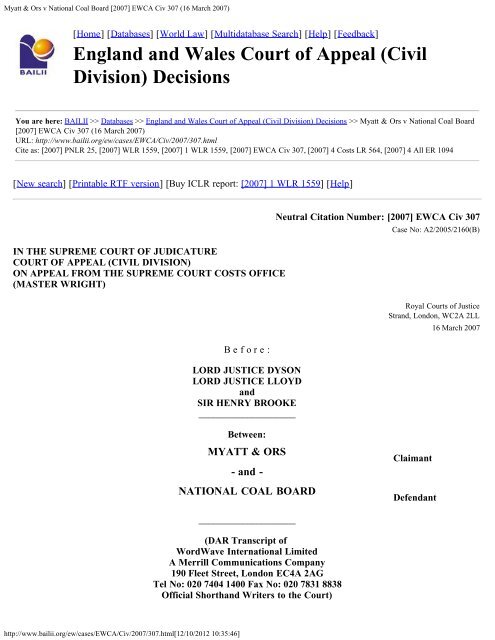
![Neutral Citation Number: [2010] EWHC 941 (QB) - Harbour ...](https://img.yumpu.com/47188668/1/190x245/neutral-citation-number-2010-ewhc-941-qb-harbour-.jpg?quality=85)
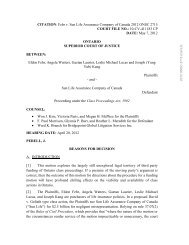
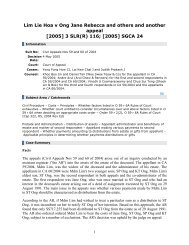
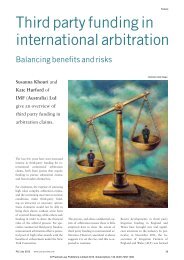
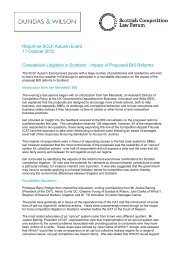
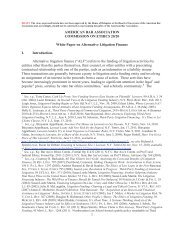

![Hall v Poolman [2009] - Harbour Litigation Funding](https://img.yumpu.com/37488843/1/190x245/hall-v-poolman-2009-harbour-litigation-funding.jpg?quality=85)
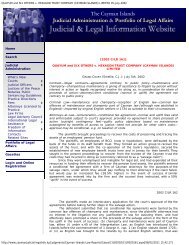
![[2013] SGHC 135 - Singapore Law Watch](https://img.yumpu.com/37488807/1/184x260/2013-sghc-135-singapore-law-watch.jpg?quality=85)
